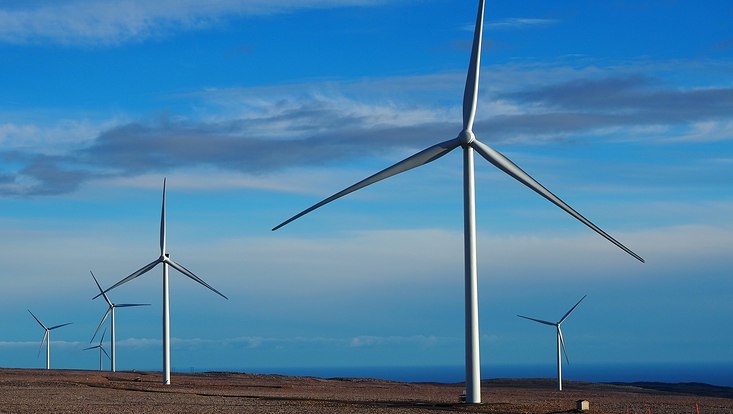Society Research
Press release of the German Climate Consortium (DKK)What is the IPCC report on climate change mitigation about?
17 March 2022, by CSS

Photo: Geran de Klerk/unsplash
Dependencies on oil and gas, dependencies on CO2 removal technologies and being stuck in outdated financial flows - there are many obstacles to overcome in order to stop climate change. Experts explained the scientific background at the press briefing of the German Climate Consortium a good two weeks before the publication of the new world climate report on climate change mitigation. CSS member and co-director Kerstin Lopatta shared her expertise on Sustainable Finance.
This article is an English translation of the press release of the German Climate Consortium (Deutsches Klima-Konsortium, DKK). The original press release can be found here [in German].
"The new IPCC report comes at a moment of decision. The Russian crisis forces energy policy decisions: Europe must brace itself for an oil and gas embargo, it must reduce its dependence on Russian gas and oil in the short term, invest in the development of a hydrogen infrastructure and massively push ahead with the expansion of renewable energies," Professor Ottmar Edenhofer commented on the global political situation at the press briefing of the German Climate Consortium a good two weeks before the new publication of the Intergovernmental Panel on Climate Change (IPCC). "In the EU, the Green Deal is on the knife's edge: climate policy blockade or departure for a comprehensive CO2 pricing. Europe can only cope with rising gas prices if there is comprehensive social compensation. And China and the USA must decide: Confrontation, also on the issue of climate cooperation, or entry into a joint climate club that sets global standards. The IPCC report will show all these actors what measures can be taken - and paths for the sustainable safeguarding of our economy. Science is drawing the maps with all the danger spots and pathways so that policy-makers can make fact-based decisions," Edenhofer continues.
He is the chief economist and director of the Potsdam Institute for Climate Impact Research and knows the work of the IPCC well, having played a key role in shaping the contribution on mitigation to the last Fifth Assessment Report as co-chair. Seven years have passed since then, during which a lot has happened in international climate research - the current status is summarised in the new contribution of Working Group III to the Sixth IPCC Assessment Report. It is about what we can do to stop climate change. The report also provides a tangible stocktaking of whether climate policy has set the right course for the implementation of the Paris Climate Agreement. On Monday, the last step before the planned publication on 4 April begins: the adoption in the IPCC plenary of the member states.
Why we need to talk about negative emissions, but why they are not a panacea
"The upcoming IPCC report will show different paths into the future of how global greenhouse gas emissions could develop: In terms of pathways to a world that does not threaten the Paris climate goals, the next few years are crucial. We need rapid and deep emission reductions already before 2030 and global CO2 neutrality by mid-century - the more time passes without tangible climate protection, the faster and more intensive these reductions must be. And the more emissions are left by 2050, the more CO2 will have to be taken out of the atmosphere - here, too, as with oil and gas, undesirable dependencies could arise," said Professor Sabine Fuss. The unpopular but arithmetically necessary topic of CO2 removal in the pathways is one of the specialities of the economist, who worked as lead author on the 1.5 degrees report. She explained that research has evolved since then: "Recent scenarios show that greater efforts to keep residual emissions low can at least reduce this dependency. The new report, for example, has for the first time a chapter on how much a different consumption and lifestyle could contribute to climate protection."
Sustainable Finance as a new topic in the report and lever for a sustainable future
Another new topic in the report was presented by Professor Kerstin Lopatta from the Center for Sustainable Society Research (CSS) at Universität Hamburg: "Finance is an important lever to enable and accelerate the transformation of our society towards a climate-neutral and liveable world. This is why a lot of research has been done on the topic of sustainable finance in recent years. The term describes investments in the sustainable design of the economy, business models and production processes - it is about using the huge financial flows of this world in such a way that they help to secure our future instead of endangering it. This requires a reliable policy framework, transparent corporate reporting and international standards - there is still a lot of potential for policymakers here."
The upcoming IPCC report on climate change mitigation follows on from the previous two volumes: Working Group I ("Natural Science Basis") set out in August 2021 how the climate is changing and that humans are primarily responsible for it. Working Group II ("Consequences, Adaptation and Vulnerability") summarised the comprehensive findings on the dramatic consequences of climate change for humans, animals and plants at the end of February this year - but also showed that we can reduce the risks. Working Group III will show how far-reaching and comprehensive we need to act to actually reduce emissions. All three volumes will be compiled in a synthesis report in September and provide important input to the 27th World Climate Conference in Sharm El-Sheikh, Egypt, in November.
About the Experts
► Prof. Dr. Kerstin Lopatta is Director of the Center for Sustainable Society Research (CSS) at Universität Hamburg and works as a professor of business administration on external accounting, auditing and sustainability.
► Prof. Dr Ottmar Edenhofer is Director of the Potsdam Institute for Climate Impact Research (PIK), Director of the Mercator Research Institute on Global Commons and Climate Change and Professor of Climate Economics at the Technical University of Berlin. As co-chair of Working Group III from 2008 to 2015, he played a key role in shaping the previous, fifth edition of this report.
► Prof. Dr. Sabine Fuss is head of the working group on sustainable resource management and global change at the Mercator Research Institute on Global Commons and Climate Change and professor at Humboldt-Universität zu Berlin. She was lead author on the 1.5 degrees report and also contributed as an author to the volumes of Working Group I and II of the current Sixth Assessment Report.
Note: The three researchers are not part of the report's author team, but have expertise on key aspects.
Contact: Elisabeth Weidinger, Referentin für Presse- und Öffentlichkeitsarbeit, Deutsches Klima-Konsortium, elisabeth.weidinger"AT"klima-konsortium.de
About DKK
The German Climate Consortium (DKK) is a scientific association and represents leading actors in German climate research and climate impact research. This includes universities, non-university research institutions and federal authorities. In total, more than 4000 scientists at the 26 research organisations of the consortium conduct research on climate. The DKK stands for science-based policy advice, addresses current issues and provides background information from the perspective of experts.


